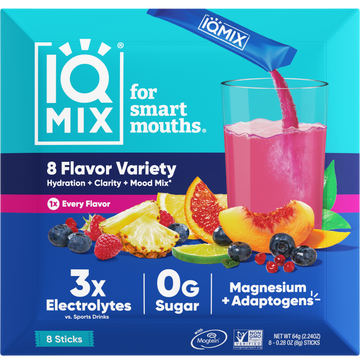In the hustle and bustle of life, many seek solace and energy in a freshly brewed cup of coffee. But what if that daily caffeine boost could be coupled with added nutritional benefits? Enter magnesium coffee, which is simply regular coffee enhanced with magnesium.
While coffee has long been associated with sharpening cognitive faculties and keeping sleepiness at bay, combining it with magnesium promotes a more rounded health experience. From fortifying brain function to supporting overall well-being, let’s explore the benefits of this innovative brew.
The Benefits of Magnesium Coffee
Magnesium coffee is a newer trend, with only a handful of brands (including IQJOE!) offering the combo. As such, research on this specific blend is scant. However, the individual advantages of coffee and magnesium have been extensively studied. From that research, we can better understand the potential benefits of magnesium coffee.
Coffee Benefits
Let’s start by exploring the top benefits of drinking coffee.
#1: Improves Focus and Energy
Coffee contains caffeine, a central nervous system stimulant, that primarily works by blocking adenosine receptors.[*] Adenosine is a neurotransmitter that promotes relaxation and sleepiness by slowing down nerve cell activity.
During the day, adenosine levels rise, making you feel increasingly drowsy and ready for sleep. Caffeine counters this by binding to adenosine receptors, preventing them from being activated. This results in increased alertness, focus, and wakefulness.
#2: May Safeguard Against Dementia
Research indicates a potential protective role of coffee against conditions like Alzheimer’s and Parkinson’s disease.
A review analyzing 13 studies found that habitual caffeine consumers displayed a notably reduced risk of developing Parkinson’s disease. What’s more, consistent caffeine intake slowed the progression of Parkinson’s over time.[*]
Similarly, an analysis of 11 studies revealed a compelling pattern: higher coffee consumption correlated with a decreased risk of Alzheimer’s disease.[*]
#3: Supports Mood Enhancement
Caffeine, the primary psychoactive substance in coffee, has been linked to the release of certain feel-good neurotransmitters like dopamine and serotonin. These play a pivotal role in mood regulation, helping to lift one’s spirits and stave off feelings of gloom.
One review of seven studies found that each cup of coffee people consumed per day was linked to an 8% lower risk of depression.[*] We’ll drink to that!
#4: Antioxidant Properties
It’s not all about caffeine. Coffee is abundant in bioactive compounds, including powerful antioxidants like chlorogenic acid. These not only combat oxidative stress, but also have potential neuroprotective effects, safeguarding the brain from degenerative diseases and age-related decline.[*]
Magnesium Benefits
Next, let’s talk about the health benefits of magnesium. This mighty mineral plays a pivotal role in your overall health. It can be found in some foods like leafy greens, whole grains, and legumes, and is also available in supplement form.
While true magnesium deficiency is rare, research shows that approximately 50% of U.S. adults get less than the recommended daily amount of magnesium.[*]
When added to coffee, it tacks on a suite of additional health advantages—many of which overlap or work synergistically with coffee.
Here are some of the benefits to consider:
#1: Acts as a Cofactor for Hundreds of Bodily Functions
One of the main roles of magnesium is to act as a cofactor (a helpful molecule) in enzymatic reactions, supporting more than 600 reactions in your body, including:[*]
- Converting food into energy
- Creating new proteins from amino acids
- Supporting the creation and repair of DNA and RNA
- Aiding in muscle contraction and relaxation
- Regulating neurotransmitters, which send messages throughout your brain and nervous system
#2: Supports Cognition
Magnesium is available in various forms, such as magnesium citrate, magnesium oxide, and magnesium chloride. However, only one type of magnesium—magnesium l-threonate—has been clinically proven to cross the blood-brain barrier and reach neurons directly.[*]
Once it’s absorbed by brain tissues, magnesium L-threonate delivers many cognitive benefits. For instance, a 2015 in vitro study revealed that magnesium L-threonate boosted the density and energy efficiency of synapses—the structures responsible for neuron-to-neuron communication.[*] As a result, learning, memory, and intricate thought processes are enhanced.
#3: Reduce Anxiety, Stress, and Depression
Magnesium plays a critical role in brain function and mood, with low levels being linked to an increased risk of depression and stress.[*]
Even if you’re already feeling a bit down in the dumps or on edge, magnesium could still help. A 2011 animal study illustrated that by enhancing brain magnesium levels with Magtein®, subjects exhibited more measured responses to stressful situations, leading to a notable decrease in overall anxiety and stress.[*]
Additionally, a 2017 study found that taking 248 mg of magnesium daily for six weeks decreased symptoms of depression and anxiety.[*]
Magnesium Coffee: A Dynamic Duo
When two potent forces like magnesium and coffee unite, the resulting synergy offers potential enhanced outcomes, including:
- Cognitive protection: Merging the antioxidant prowess of coffee with magnesium’s neural support may offer an elevated shield for the brain, safeguarding it against various external and internal stressors.
- Mood: Both magnesium and coffee offer mood-lifting benefits, opening the door to a happier, calmer you.
- Mitigated coffee jitters: Magnesium, known for its muscle-relaxation and nervous system regulatory properties, might counteract the jittery side effects some individuals experience with caffeine. This could provide a smoother, more pleasant energy lift.
How Much Coffee Is Beneficial?
As for how much coffee is beneficial, the answer can vary based on individual tolerances, however, the general guideline is up to 400 milligrams (mg) of caffeine a day for healthy adults. [*] That's roughly the amount of caffeine in four or five cups of brewed coffee.
In the studies involving brain health and decreased risk of neurodegenerative diseases such as Alzheimer’s and Parkinson's, the beneficial window was 3-5 cups daily.[*] Coffee lovers, rejoice!
How to Experience Magnesium Coffee for Yourself
So, how do you hop on the magnesium coffee train? While you can manually add magnesium to your morning brew or pop magnesium capsules alongside your regular coffee, there’s an even more convenient route.
Opting for a pre-formulated instant coffee like IQJOE takes the guesswork out of the equation. Each stick of IQJOE contains the following:
- 750mg Magtein® (Mg L-Threonate): A clinically studied form of magnesium for cognition + mood
- 250mg Lion’s Mane (8X-Concentration): A super-concentrated form of Lion’s Mane for brain support
- 200mg Natural Caffeine: For jitter- and crash-free energy
Pick from these delicious flavors: Original Black, Vanilla Spice, Toasted Hazelnut, or Caffè Mocha. Or try our IQJOE Variety Pack to find your favorites!
As you work to foster clarity, energy, and balance in your bustling life, why not let your coffee work a bit harder for you?
Written by Katie Koschalk, a health and wellness writer, certified holistic nutritionist, and certified personal trainer based in California.




